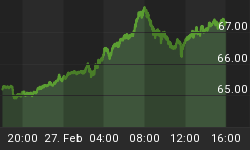Commodities are hot once again after a disastrous performance at the end of 2018 when energy prices collapsed and the escalating U.S.-China trade war spooked investors.
At the start of 2019, however, the sentiment is quite different from the fourth quarter of 2018—signs have started to emerge that the world’s two biggest economies will reach some sort of a trade deal.
Investors are plowing money back into specialized commodities funds with billions of U.S. dollars of inflows into assets under management (AUM) in commodities funds in the first quarter of 2019.
In January to March, commodities were also the asset class with best returns of all assets.
Apart from hopes that U.S. and China will reach a trade agreement, investor appetite for commodities is also boosted by signs of rising inflation—an environment in which commodities typically outperform other assets, The Street’s Simon Constable writes.
The markedly dovish stance of the Fed and other major central banks—a U-turn from last year’s interest rate hikes—also boost interest in commodities.
Commodities are also attracting investors looking to diversify from equity markets, where price-to-earnings ratios suggest that stocks are overvalued.
According to a Barclays report, cited by The Street, investors plowed US$14.7 billion in commodity funds in the first quarter of this year “amid positive sentiment towards risk assets.”
“This reversed most of the losses in AUM during Q4 [the fourth quarter last year], when investors withdrew funds as prices collapsed,” The Street quoted the Barclays report as saying.
Related: Gold Mining Stocks Are Soaring
A large part of the Q1 inflows into commodities funds—US$5.5 billion—was piled into energy funds, followed by inflows into agriculture funds with US$4.2 billion, with the rest invested in funds underpinned by precious metals and industrial metals, according to Barclays.
Commodities were the best-returning asset class in Q1, according to data from Bank of America Merrill Lynch Global Research, cited by the Financial Times.
Between January and April 4, commodities returned 16.6 percent, beating the 13.6-percent return of global equities and the high-yield bond return of 6.7 percent, BofA Merrill Lynch Global Research data showed.
Although the commodities’ top performance in Q1 comes from a very low base in Q4 2018, when prices collapsed, commodities—especially mining commodities—still have room to rise, because of supply outages and expected limited growth, Colin Hamilton at BMO Capital Markets told FT.
According to Baird Private Wealth Management’s Q1 2019 Market ChartBook, year-to-date returns of the broad commodity market in Q1 stood at 6.3 percent, while among the various commodities, crude oil returned 30.2 percent, unleaded gas – 26.7 percent, and energy – 15.9 percent.
Going forward, the outlook for commodities could become even brighter if the U.S. and China reach a trade deal and if Beijing manages to stave off economic growth slowdown with fiscal stimulus. Since China is a major commodities consumer, the health of the Chinese economy could be indicative of the commodities performance.
ING expects fiscal stimulus in China to continue supporting the economy throughout 2019.
Related: Billion-Dollar Esports Niche Could Be In The 2024 Olympics
“If the external environment does not deteriorate further, we believe that the fiscal stimulus and monetary easing on private firms should be large enough to keep economic growth above 6.0%, which is in line with our forecast of 6.3% growth in 2019,” said Iris Pang, Economist, Greater China, at ING.
Before 2019 began, BofA Merrill Lynch Global Research said in its Global Commodities Outlook 2019 that commodities face three key downside risk challenges this year: a meaningful increase in the Fed funds’ rate in the next 12 months, an intensified U.S.-China trade war, and material worsening in emerging market credit cycle.
At least for the time being, it looks like the first two downside risks may not materialize this year. The Fed adopted a dovish stance in its latest meeting, saying that “the evolution of the economic outlook and risks to the outlook would likely warrant leaving the target range unchanged for the remainder of the year.”
Meanwhile, signs point to progress in the U.S.-China trade talks, with Treasury Secretary Steven Mnuchin telling CNBC on Wednesday “We’ve pretty much agreed on an enforcement mechanism” on a trade deal.
By Tsvetana Paraskova for Oilprice.com
















